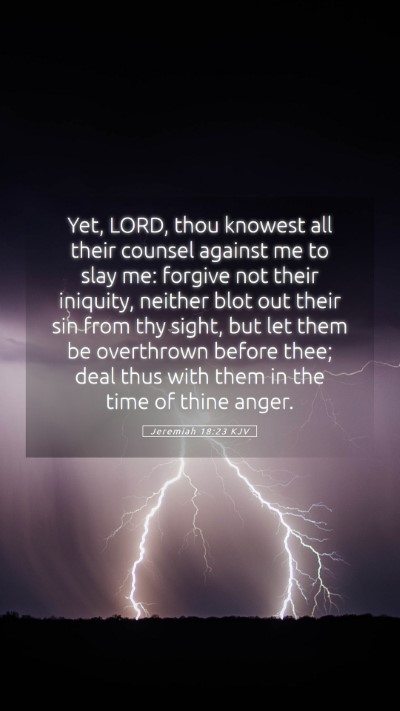Understanding Jeremiah 18:23
Bible Verse: Jeremiah 18:23 - "Yet, Lord, you know all their plots to kill me. Do not forgive their sin or blot out their guilt from your sight; let them be overthrown before you. Deal with them in the time of your anger."
Introduction
This verse takes place during a crucial moment in the ministry of Jeremiah, the prophet. It embodies a plea that reflects deep emotional turmoil and the conflict between divine justice and human wrongdoing. The context surrounds Jeremiah's frustration with the people of Judah who have turned away from God and are plotting against him. Understanding this verse requires examining the broader themes of divine judgment, human rebellion, and the nature of wrongdoing.
Commentary Insights
-
Matthew Henry's Commentary
Matthew Henry emphasizes the theme of divine omniscience in this verse. He notes that Jeremiah acknowledges God's absolute knowledge of human plots and intentions. Such awareness establishes a foundation for the prophet's yearning for divine justice against his adversaries. Henry explains that the request for the people's sins not to be forgiven highlights a profound desire for accountability and authenticity in spiritual matters.
-
Albert Barnes' Notes
Albert Barnes expands on the concept of divine retribution presented in this verse. He points out that Jeremiah is essentially calling for a divine counteraction against those who seek his life. Barnes remarks that this expression of vengeance is indicative of the covenant relationship between God and His people, which implies that sin ultimately leads to consequences. Barnes asserts that this reflects a deeper theological truth about the seriousness of sin and the necessity of God's justice.
-
Adam Clarke's Commentary
Adam Clarke offers a personal perspective on Jeremiah's sentiments. He interprets the plea as a reflection of the deep anguish experienced by the prophet in the face of betrayal and danger. Clarke's analysis touches on the idea that Jeremiah, while appealing for justice, also recognizes the weight of judgement bearing on human actions. He suggests that the text invites readers to contemplate the balance between God’s mercy and justice in the life of individuals and in society.
Thematic Analysis
This verse invites reflection on several key themes:
- Divine Knowledge: God’s awareness of human plans signifies the futility of hiding one’s intentions from Him.
- Human Rebellion: The plot against Jeremiah reflects a broader tendency among the people to resist God and His messengers.
- Justice and Retribution: The desire for divine justice is a recurring theme; it poses the question of how God responds to sin and rebellion.
- Emotional Turmoil: Jeremiah's cry reveals the deep emotional scars left by betrayal and the searching for justice.
Application and Relevance
The implications of this verse stretch beyond its immediate context. For contemporary readers, it holds significance in understanding the nature of conflict between good and evil, as well as the appropriate response to injustice. When faced with betrayal or difficulty, believers can reflect on the sovereignty of God, knowing that He sees all and is attentive to the struggles of His faithful servants.
Cross-References
- Psalm 10:14 – Understanding God’s perception of wrongdoings.
- Jeremiah 7:16 – God's instructions concerning prayer for the people.
- Romans 12:19 – God’s call for believers to leave vengeance to Him.
Conclusion
Jeremiah 18:23 serves as a powerful reminder of the complexities of faith, justice, and human shortcomings. Its depths invite ongoing reflection in Bible study groups, personal study, and scholarly endeavors. By exploring such verses in detail, individuals can acquire valuable Bible study insights and foster a deeper appreciation for the richness of scripture.


